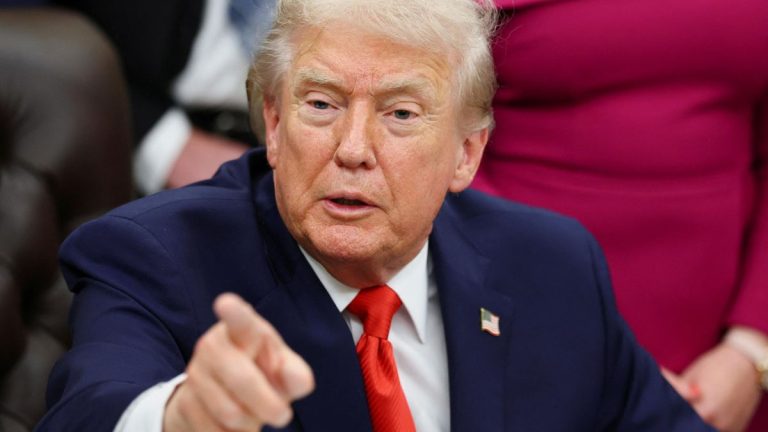The U.S. Senate on Tuesday confirmed Anne-Leigh Gaylord Moe, President Donald Trump’s nominee to serve as U.S. District Judge for the Middle District of Florida, marking another key judicial victory for the administration.
The vote was 53–46, with all Republicans present voting in favor and a small number of Democrats joining them in support.
President Trump celebrated the confirmation in a post on his Truth Social account, praising Moe’s record as a strong advocate for law and order.
“I am pleased to announce the nomination of Anne-Leigh Gaylord Moe to serve as Judge on the United States District Court for the Middle District of Florida,” Trump wrote.
“Anne-Leigh has fiercely advocated for Sunshine State residents as a Judge on Florida’s Second District Court of Appeals, and as Trial Judge on Florida’s Thirteenth Judicial Circuit Court. Anne-Leigh will prioritize LAW AND ORDER unlike other activist Judges who put the safety of Illegal Criminals over the safety of AMERICANS. Congratulations Anne-Leigh!”
A Veteran of Florida’s Judiciary
Judge Anne-Leigh Moe has spent her career in Florida’s judicial system, serving as a respected jurist across multiple levels of state courts.
Since 2022, she has been a judge on Florida’s Second District Court of Appeal, where she handled complex civil and criminal appeals involving constitutional, business, and family law issues.
Before her appellate appointment, she spent nearly a decade as a circuit judge in Florida’s Thirteenth Judicial Circuit, which includes Hillsborough County and the Tampa area.
Moe began her career as an assistant state attorney in Tampa, prosecuting felony cases and developing a reputation for being a tough but fair prosecutor. Her colleagues have described her as “deeply principled” and “highly disciplined.”
Her new position in the federal judiciary represents a significant elevation from the state system to one of the busiest federal districts in the country — a jurisdiction that covers major cities such as Tampa, Orlando, and Jacksonville.
Judicial Philosophy and Record
Throughout her career, Moe has emphasized a strict constructionist approach to the law, focusing on textual interpretation of statutes and adherence to constitutional principles.
Legal observers say her judicial record reflects a preference for judicial restraint and a consistent defense of individual rights under the Constitution.
Her appellate rulings often drew attention for their clarity and directness, particularly in cases involving state constitutional questions and criminal procedure.
While her nomination drew criticism from some Senate Democrats who claimed she may be “ideologically aligned” with the administration, supporters countered that Moe’s record demonstrates professional integrity and even-handedness in applying the law.
Sen. Rick Scott (R-FL), who supported her nomination, praised her service record, saying she “represents the best of Florida’s judiciary — committed, competent, and courageous.”
https://twitter.com/EricLDaugh/status/1980711280764940609
Another Major Judicial Win for Trump
Moe’s confirmation marks the latest in a growing list of judicial appointments under the Trump administration.
President Trump has prioritized the federal bench since returning to office, building on his first-term legacy of reshaping the courts.
Over the past year, the Senate has confirmed more than a dozen Trump nominees to lifetime positions on district and appellate courts.
Observers note that the Middle District of Florida is one of the most active jurisdictions in the federal system, handling thousands of civil and criminal cases annually. Moe’s appointment is expected to strengthen the bench’s conservative credentials.
Her confirmation also continues the administration’s broader effort to appoint judges with backgrounds rooted in state-level experience and prosecutorial work, reflecting Trump’s stated emphasis on “judges who understand the real-world impact of the law.”
Political Context: Shutdown Stalemate and Public Opinion
The confirmation came amid a prolonged government shutdown, which entered its fourth week as Congress remained at a political impasse.
While federal courts remain open due to contingency funding, the broader political climate has dominated Washington headlines.
According to analysis from CNN’s Harry Enten, the shutdown has not significantly affected Trump’s public approval — a striking contrast to previous standoffs.
Enten noted that during the 2018–2019 shutdown, Trump’s approval rating declined by three percentage points within the first few weeks. This time, however, polling data suggests little to no erosion in his support.
“This shutdown hasn’t eaten into Donald Trump’s support at all,” Enten said. “His net approval rating is actually up a point in terms of his popular support.”
Polls indicate that fewer Americans now blame the president for the shutdown compared to his first term. In 2019, about 61% of respondents said Trump was primarily responsible; that number has dropped to 48% in the latest surveys.
The analysis suggests that voters see Congress — not the president — as the key actor responsible for funding legislation, a shift that has helped buffer Trump politically.
“It’s no real wonder that Donald Trump, at this point, looking at the shutdown, says, ‘You know what? It’s not actually harming me politically,’” Enten concluded.
Partisan Divide on Spending and Policy
The shutdown stems from an ongoing dispute over federal spending legislation.
Democrats in the Senate have pledged to block any bill that fails to extend Affordable Care Act subsidies, which are set to expire later this year.
Republicans, meanwhile, have pushed for a short-term funding resolution that would reopen the government while longer-term negotiations continue.
With only slim majorities in both chambers, any funding measure will require bipartisan cooperation — something that has proven elusive so far.
As a result, the Senate has turned its attention to areas where progress is possible, such as judicial confirmations and bipartisan nominations. Moe’s confirmation became one of the few points of agreement that could advance despite the gridlock.
Trump’s Broader Judicial Strategy
Legal analysts note that Trump’s continued focus on the judiciary is part of a long-term strategy to secure conservative influence over the federal courts.
During his first term, Trump and Senate Republicans confirmed more than 230 federal judges, including three Supreme Court justices — a record pace unmatched by recent administrations.
The renewed effort to fill vacancies in 2025 continues that trajectory, with the White House prioritizing nominees with strong law enforcement and appellate experience.
“This is about ensuring that the courts uphold the Constitution as written,” Trump said during a recent campaign event. “We’re appointing judges who will defend your rights, your borders, and your communities.”
Moe’s appointment underscores that emphasis, particularly in a region of Florida where federal cases often intersect with immigration, business regulation, and criminal enforcement.
Conclusion
Anne-Leigh Moe’s confirmation as U.S. District Judge for the Middle District of Florida adds another experienced jurist to the federal bench — and marks a significant victory for the Trump administration’s judicial agenda.
Her record as a prosecutor, circuit judge, and appellate jurist suggests a commitment to law, order, and constitutional fidelity, principles that have guided her throughout her career.
As the administration continues to navigate legislative gridlock, judicial confirmations like Moe’s demonstrate that one area of government remains firmly in motion — the steady reshaping of America’s courts for decades to come.

Emily Johnson is a critically acclaimed essayist and novelist known for her thought-provoking works centered on feminism, women’s rights, and modern relationships. Born and raised in Portland, Oregon, Emily grew up with a deep love of books, often spending her afternoons at her local library. She went on to study literature and gender studies at UCLA, where she became deeply involved in activism and began publishing essays in campus journals. Her debut essay collection, Voices Unbound, struck a chord with readers nationwide for its fearless exploration of gender dynamics, identity, and the challenges faced by women in contemporary society. Emily later transitioned into fiction, writing novels that balance compelling storytelling with social commentary. Her protagonists are often strong, multidimensional women navigating love, ambition, and the struggles of everyday life, making her a favorite among readers who crave authentic, relatable narratives. Critics praise her ability to merge personal intimacy with universal themes. Off the page, Emily is an advocate for women in publishing, leading workshops that encourage young female writers to embrace their voices. She lives in Seattle with her partner and two rescue cats, where she continues to write, teach, and inspire a new generation of storytellers.









